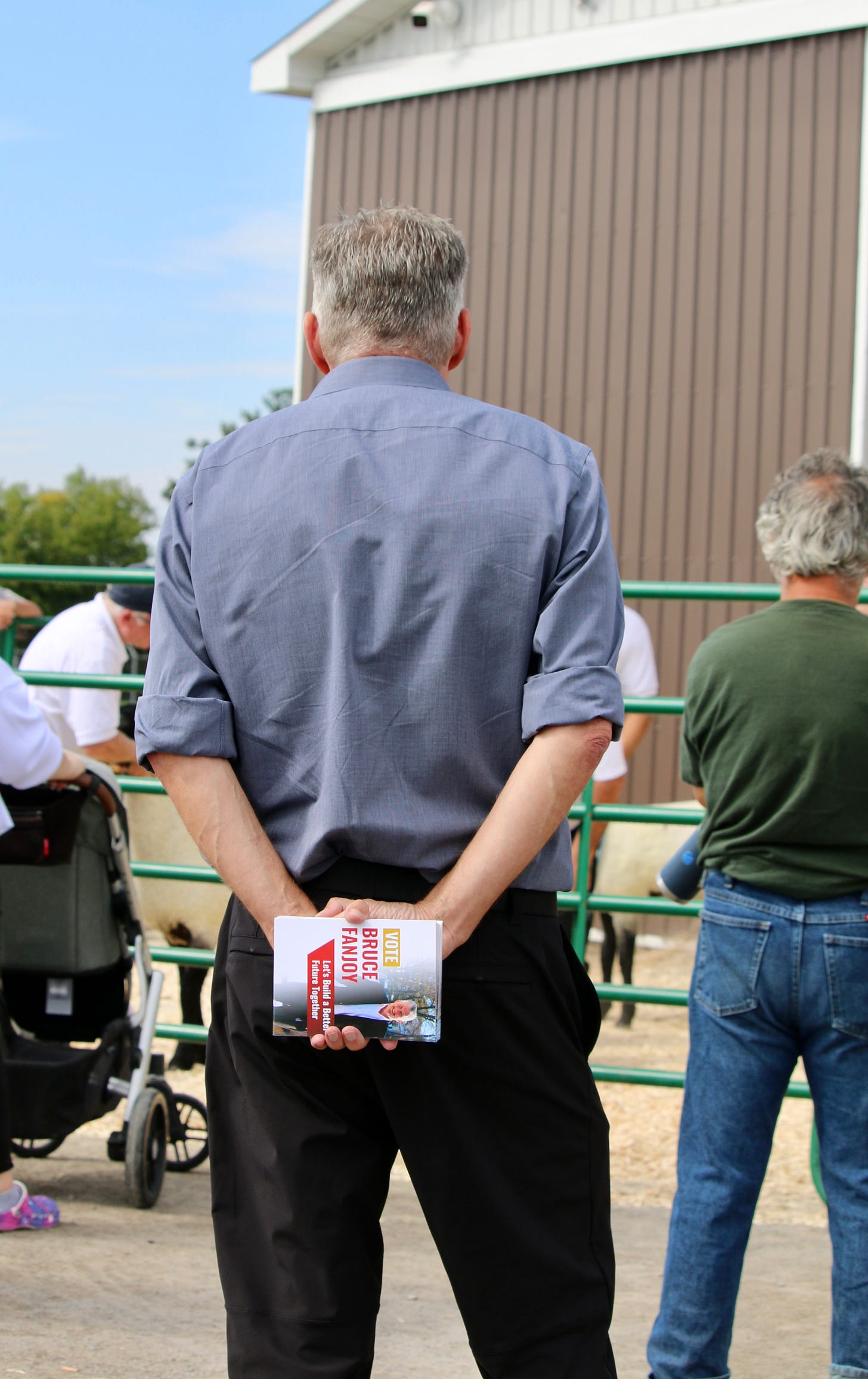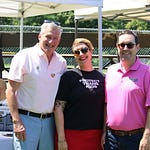The book is available in print, ebook and audio book formats.
[Chapter One] [Chapter Two] [Chapter Three] [Chapter Four] [Chapter Five] [Chapter Six]
Garbage Advocate
In November 2023, Pierre Poilievre took a victory lap to celebrate the Federal Court ruling on the Liberal government’s plastic ban. Bruce Fanjoy reacted by calling him a “garbage advocate” on Twitter. That tweet took off and led to many people offering to volunteer on his campaign to defeat him in Carleton.
Before we get to the tragic disappearance of climate change from campaign priorities in the 2025 political reality, I want to say a few things about the particular ways in which Bruce worked social networks to his advantage.
He used humour, which is an extraordinarily potent tool when you’re the unknown guy taking on the man everyone assumes will win again just because he’s won seven times before.
If you make people laugh, they’re more likely to remember you. It’s a great weapon against name recognition. Provided you use it well.
Nobody, not even the world’s best and most successful comedian, is funny all the time. In fact, most people aren’t funny at all, which is a sad truth you discover when you spend a great deal of your time scouring Twitter for news of things you can use for your commentary, to pick an example at random.
Bruce Fanjoy is funnier than most. But in a political campaign, you have to be careful to use your wits in ways that help you gain more supporters and not lose any. Without over-thinking everything, which can make you stilted. How do you let yourself be free and funny, but at the same time guard against costly mistakes you might regret?
Part of the solution to this problem is to have a small group of people around you whose advice you trust. Too big a group doesn’t work — you get lost in endless rounds of approvals and you wind up triple-guessing yourself, and you just feel to the world like a cardboard cutout. Too small a group is also dangerous, especially if you pick people whose minds are wired the way yours is.
Is three people the magic number?
I don’t know how many people Bruce showed his tweets to when he wanted to do a gut check. I know I was in the group, and not because I’m especially funny. I mean, I like to think I am, but this isn’t about my sense of humour. I was in the group because I have lots of experience in public relations, and I’m very good at being paranoid. If I don’t think there’s a problem with something, then odds are very good there’s no problem with that something.
Over the course of a 25-year career in and around the media, I’ve seen more than my share of gaffes and jokes that went sideways, burst into flames, exploded in the jokester’s face, destroyed careers, and otherwise didn’t work.
A classic of the genre is the Reform Party of Preston Manning showing big close-ups of Jean Chrétien’s face, shots that over-emphasized the Liberal leader’s facial paralysis with comments like, “Is this a prime minister?”
Chrétien, for those of you who are too young to remember the 1990s, had one side of his face paralyzed after an attack of Bell’s palsy in his youth. Something he used to his advantage by claiming he was a politician who didn’t talk out of both sides of his mouth. Talk about scoring points with humour.
But only he could joke about his facial paralysis. The Reform fellows were left looking like terrible meanies. And that never pays in politics. A lesson Pierre Poilievre clearly failed to learn.
To be fair to the man, Pierre Poilievre did campaign very much as himself. I heard someone on the news comment that he may be one of the most authentic politicians Canada has ever had, certainly in recent history. One of its most successful, too. He did get his party to over 40% of the popular vote, which isn’t nothing.
And he did that as himself. The attack style, the name-calling, the monosyllabic slogans, that’s who he is. Not that he can’t cobble together a full sentence. He can. He’s much smarter than his image suggests. But he has anger – or at least resentment – issues that are very close to the surface.
Bruce Fanjoy, by contrast that would become clear to the electors of Carleton, is a much happier person. He jokes, smiles, and tries to see the good in people.
Yes, he can be biting. But I’ve never seen him being mean to anyone.
But you want to know about the method. It was pretty simple. In the early days, Fanjoy’s social network of choice was Twitter. He would engage there quite regularly. Every now and then, as needed, he’d text me a draft of something with “Y, N, E?”
The E was for “edit.” I’d text back right away. If it was Y, great. If it was E, then I’d suggest my edits in the text and he would make the final call whether to accept them or not. If I said N, we’d chat on the phone about it. The Ns were very few and far between. Usually, the Es were minor tweaks. Most of the time, it was Y.
The system worked well. I am not about to spill a bunch of secrets about potentially embarrassing tweets that got aborted because in all honesty there weren’t any.
There were a handful of occasions when my Ns were more “not now” than “nope,” and we talked about the right timing for certain clever comebacks. Keeping one’s powder dry for the best possible moment is a basic communication skill; otherwise, there wasn’t anything special in what we were doing. The only part that was slightly unusual is that I was dealing with a newbie politician who was eager to listen to trusted people before making important decisions.
OK, I’ll spill one small bean. I wasn’t wild about using “garbage advocate.” It proved to be very popular, and I was wrong. So there.
There is no secret, however, in the fact that Bruce Fanjoy is a strong environmentalist. He designed and built a net-zero house from scratch, for crying out loud. He’s got Elizabeth May’s books – he admires her work – and she signed his copies.
He considers the fight to get climate change under control an existential one. As he likes to say, there is no business environment without a climate environment in which humans can survive.
Yes, there are plenty of important reasons why acting on climate is hard, or expensive, or both. But the truth is, we can’t afford to keep kicking the climate can down the road for future generations to deal with. Everyone who’s an adult at this point has to step up. We are going to be judged on what we did to address this issue. If anything is done at all, that is.
The debate almost always runs in circles around whether we can afford to tackle the crisis. As if we had a choice in the matter. Yes, some of the changes we need to make right now (because we missed making them decades ago) will require us to get used to different habits. Some will cost money too. But if we don’t act, it’ll cost a whole bunch more.
Fanjoy always says we shouldn’t pit the environment against the economy. That people who are worried about affordability and whether their kids and grandkids will ever be able to put a roof over their heads, should be equally worried about the climate crisis.
Without an environment in which to live, it doesn’t really matter how much housing costs. Both, in other words, are intrinsically linked. One simply cannot exist without the other.
Pierre Poilievre, by contrast, spent years talking about axing the carbon tax – both industrial and consumer – even after the consumer tax was axed, as the first measure taken by Mark Carney once he was sworn in as prime minister. Fanjoy’s take was that Poilievre wanted to make pollution free again.
That’s not a solution, he’d say over and over again. One of the reasons why we’re in such a pickle, climate-wise, is precisely because pollution has been either free or very cheap for much too long already.
Fanjoy spent two years making the case that the Poilievre agenda would make those who are already well-off even more comfortable, and wouldn’t do a whole lot for those who have less. He talked about programs that benefit residents of Carleton – like pharmacare, dental care, universal childcare, which is especially beneficial if not transformative for parents, often women, who have to sacrifice their career to look after their children.
Would those programs survive a Poilievre government? Fanjoy asked that question on thousands of doorsteps in Carleton.
Unlike many men of his generation, Bruce Fanjoy took advantage of some of those measures, including parental leave, when his children were young and his wife needed to focus on finishing medical school and getting her career under way. He also had a support network that included parents who could help if things became too hard for the young family.
Pierre Poilievre had a similar network, too. The family who adopted him was not rich, and they did face economic struggles, but they were modestly comfortable most of their lives.
Many families, including in Carleton, do not have the kind of support systems that both Fanjoy and Poilievre benefited from. They are entirely dependent on public programs to help them get through difficult patches, such as getting laid off, or having a child who requires specialized and expensive medical care, or any other crisis that can strike a family.
Canadians believe in strong public social programs. Yes, those programs could always be improved. And the government could be more efficient in managing them. Saying that is easy. Making it reality is a lot harder. Every person in Canada has a story and very often those stories aren’t shared. They are kept private, for all kinds of reasons. Everyone is just trying to do their best.
You judge a country not by how well off its most privileged persons are, but by how it treats those who have very little. Nowhere is this more important than in the area of human rights.
Canada is not the United States. But we are seeing how quickly people can lose their rights – be it abortion, gender-affirming care, or the simple right to continue their graduate studies without being deported arbitrarily.
We must never let that happen here.












